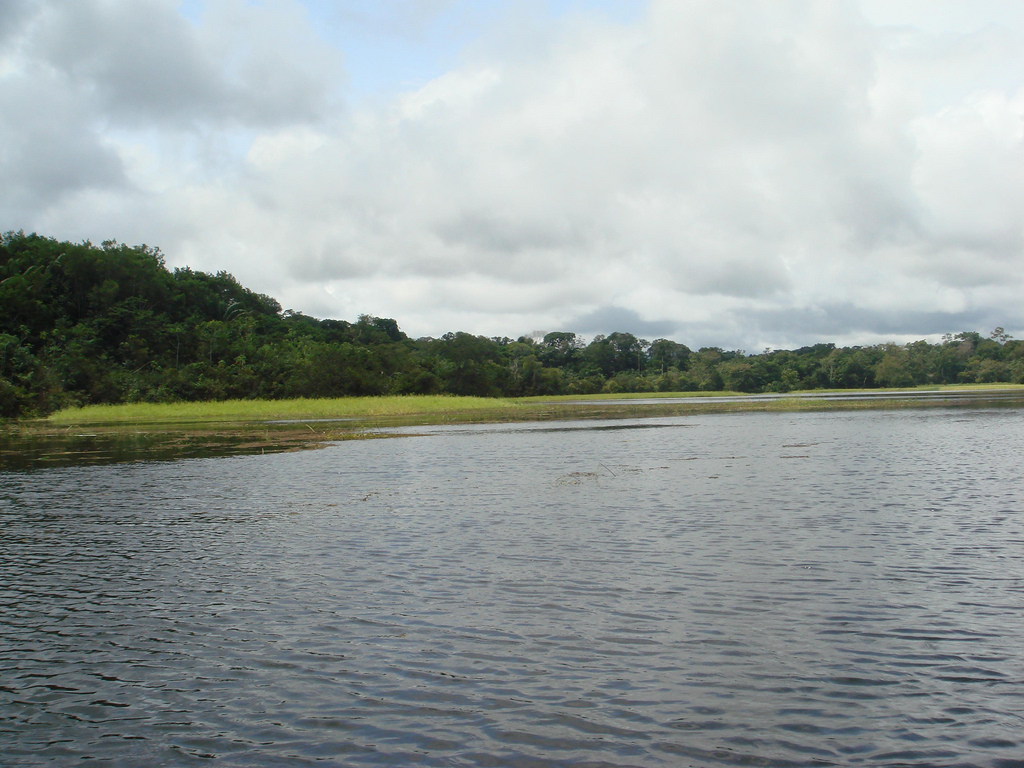
On the way to a Jungle Lodge. Photo © Mike P., licensed Creative Commons Attribution No-Derivatives.
One of the best ways to get to a sense of the rain forest is to actually stay in its midst. While primitive options exist for hard-core environmentalists, there are an increasing number of high-priced, high-style choices. Whether across the river from Manaus or hundreds of kilometers away, there are plenty of unforgettable eco-options to choose from. All include guided forest and river tours in the rates. If you’re pressed for time or money, some offer a “day-use” option. If you crave a bona fide jungle experience, you’ll need to distance yourself considerably from the city.In truth, the concept of a jungle lodge (Hotél de Selva) within the vicinity of Manaus is something of a fallacy. As the city has grown and the surrounding forest has been cleared for ranching and agriculture, original rain forest and all the wildlife it supports have become increasingly scant. If you crave a bona fide jungle experience, you’ll need to distance yourself considerably from the city.As a general rule, farther away from Manaus and smaller (intimate and personalized versus noisy and touristy) is better. While you want enough creature comforts (fans and mosquito netting are helpful) to keep you from being miserable, since the whole idea is to get in touch with nature, you don’t really need cable TV or a spa.
However, if you find yourself with little time and a hankering for a greener experience than you can get by staying in downtown Manaus and taking day trips, there are a couple of good choices.
Perhaps the most “urban” jungle lodge in the Amazon, the Tiwa Amazonas Ecoresort (tel. 92/9995-7892, R$600–1,000 d) is only a 20-minute motorboat ride across the Rio Negro from the Tropical Manaus. Although the Tiwa tries hard—accommodations are in pseudo-rustic log cabins on stilts facing a small lagoon—the “jungle” surroundings are replanted forest, and if you walk far enough, you’ll hit asphalt. However, the lodgings themselves are pleasant, and there is a lovely pool and a beach (Aug.–Nov.). Packages include treetop trekking and spotting caimans along with excursions to the Meeting of the Waters.
Farther afield but still close to Manaus is the Amazon Ecopark Lodge (Igarapé do Tarumã-Açu, tel. 92/3622-2612, R$830–1,400 for a 2-day package). A 30-minute boat ride from town, the lodge is nestled amid a lush private reserve on the banks of the Rio Tarumã. Canoe outings take you along the river and into igarapés where you’ll see lots of birds. You’ll also visit a local community for a more or less unfiltered glimpse of traditional indigenous life and culture. All tours are led by excellent English-speaking guides. For leisure, there are white-sand beaches where you can swim as well as freshwater pools for those who can’t rid their subconscious of all those piranha movies. Kids in particular will adore the monkey sanctuary, where they can interact with primates saved from the clutches of wildlife smugglers. Accommodations are quite comfortable with fine bedding, nice lighting, and attractive decorative touches such as hand-woven carpets and indigenous art. The restaurant serves creative food that takes advantage of local fish and fruits.
Located 100 kilometers (62 miles) south of Manaus, the Juma Lodge (Lago do Juma, tel. 92/3232-2707, R$1,300–1,700 pp for a 3-day package) is a three-hour boat ride from Manaus along the Rio Solimões. Completely integrated into the preserved jungle, this intimate and totally secluded lodge is an exercise in camouflage. Wooden structures on stilts connected by suspended walkways are designed according to indigenous techniques. The cabins feel like tree houses. All of them feature verandas that gaze onto either bird-filled branches or the river, where it is not uncommon to see dolphins cavorting. For exploring on your own, the lodge has dugout canoes you can paddle around in.
The most radically eco of all the Amazon’s lodges, the Pousada Uacari (tel. 97/3343-4160, R$1,200– 1,600 pp for a 4-day package) boasts an unbeatable location in the midst of the Reserva Mamirauá. Getting here requires flying or sailing up the Rio Solimões to Tefé, and then taking a 90-minute speedboat ride (provided by the pousada). The rustic accommodations are in floating wood cabins that are simple but attractive. All water comes from the river itself and is heated by solar energy. Recycling is a mantra. As part of the reserve’s commitment to sustainable development, local communities are involved in the operation of the pousada as well as leading jungle tours. Scientists who work at the Mamirauá Sustainable Research Institute are frequently present. They conduct nature talks for guests, and you can often accompany them into the field.
One of the more affordable jungle lodges, the laid-back Franco-Brazilian–owned Malocas Jungle Lodge (Lago Acajatuba, tel. 92/3648-0119, R$580–740 pp for a 3-day package) is located on along the sandy white banks of the Rio Preto da Eva, three hours from Manaus. Rustic accommodations, in indigenous-style malocas (traditional circular- shaped Indian dwellings made of wood and palm thatch) are 100-percent solar powered, and canoes are favored over motorboats, allowing abundant wild macaws and toucans to provide a continuous soundtrack. Tours led by caboclo guides include hiking to surrounding waterfalls and overnight forest campouts.
A 90-minute boat trip from Novo Airão, the Anavilhanas Jungle Lodge (tel. 92/3622-8996, R$1,300– 1,800 pp for a 4-day package) is probably the most elegant hotel de selva. The entire structure is an enchanting lesson in rain-forest minimalism. Its 16 air-conditioned guest rooms, paneled in tropical woods and decorated with Amazonian artesanato, are complemented by an open-air lounge area with lots of books and DVDs. There is also a gorgeous pool and a pretty restaurant that serves gourmet fare such as dourado fish in ginger sauce, and coconut flan. For adventure, you have the 400-plus islands of the Arquipélago Anavilhanas at your disposal. All guides are knowledgeable locals who know the igarapés and igapós like the back of their hands.
Excerpted from the Third Edition of Moon Brazil.